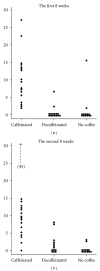Effects of 16-week consumption of caffeinated and decaffeinated instant coffee on glucose metabolism in a randomized controlled trial
- PMID: 23193459
- PMCID: PMC3502017
- DOI: 10.1155/2012/207426
Effects of 16-week consumption of caffeinated and decaffeinated instant coffee on glucose metabolism in a randomized controlled trial
Abstract
Objective. Observational studies have shown a protective association between coffee consumption and type 2 diabetes mellitus whereas caffeine or caffeinated coffee acutely deteriorates glucose tolerance. We investigated the effects of chronic drinking of instant coffee on glucose and insulin concentrations during a 75 g oral glucose tolerance test. Methods. Overweight men with a mild-to-moderate elevation of fasting plasma glucose were randomly allocated to a 16-week intervention of consuming 5 cups of caffeinated (n = 17) or decaffeinated (n = 15) instant coffee per day or no coffee (n = 13). Results. The caffeinated coffee group showed statistically significant decreases in the 2-hour concentrations and the area under the curve of glucose while neither decaffeinated coffee nor coffee group showed such a change. Waist circumstance decreased in the caffeinated coffee group, increased in the decaffeinated coffee group, and did not change in the noncoffee group (P = 0.002). With adjustment for the change in waist circumference, caffeinated and decaffeinated coffee consumption were associated with a modest decrease in the postload glucose levels. Conclusion. Both caffeinated and decaffeinated coffee may be protective against deterioration of glucose tolerance.
Figures
Similar articles
-
The effects of caffeinated and decaffeinated coffee on sex hormone-binding globulin and endogenous sex hormone levels: a randomized controlled trial.Nutr J. 2012 Oct 19;11:86. doi: 10.1186/1475-2891-11-86. Nutr J. 2012. PMID: 23078574 Free PMC article. Clinical Trial.
-
Associations between the intake of caffeinated and decaffeinated coffee and measures of insulin sensitivity and beta cell function.Diabetologia. 2011 Feb;54(2):320-8. doi: 10.1007/s00125-010-1957-8. Epub 2010 Nov 3. Diabetologia. 2011. PMID: 21046357
-
Effects of caffeinated and decaffeinated coffee on biological risk factors for type 2 diabetes: a randomized controlled trial.Nutr J. 2011 Sep 13;10:93. doi: 10.1186/1475-2891-10-93. Nutr J. 2011. PMID: 21914162 Free PMC article. Clinical Trial.
-
Coffee, diabetes, and weight control.Am J Clin Nutr. 2006 Oct;84(4):682-93. doi: 10.1093/ajcn/84.4.682. Am J Clin Nutr. 2006. PMID: 17023692 Review.
-
Caffeinated and decaffeinated coffee consumption and risk of all-cause mortality: a dose-response meta-analysis of cohort studies.J Hum Nutr Diet. 2019 Jun;32(3):279-287. doi: 10.1111/jhn.12633. Epub 2019 Feb 20. J Hum Nutr Diet. 2019. PMID: 30786114
Cited by
-
The Emerging Health Benefits of Coffee with an Emphasis on Type 2 Diabetes and Cardiovascular Disease.Eur Endocrinol. 2013 Aug;9(2):99-106. doi: 10.17925/EE.2013.09.02.99. Epub 2013 Aug 23. Eur Endocrinol. 2013. PMID: 29922362 Free PMC article. Review.
-
Inhibitory respiratory responses to progesterone and allopregnanolone in newborn rats chronically treated with caffeine.J Physiol. 2016 Jan 15;594(2):373-89. doi: 10.1113/JP270914. Epub 2015 Dec 14. J Physiol. 2016. PMID: 26497835 Free PMC article.
-
Lifestyle INtervention for Diabetes prevention After pregnancy (LINDA-Brasil): study protocol for a multicenter randomized controlled trial.BMC Pregnancy Childbirth. 2016 Mar 30;16:68. doi: 10.1186/s12884-016-0851-x. BMC Pregnancy Childbirth. 2016. PMID: 27029489 Free PMC article. Clinical Trial.
-
Purinergic signaling in diabetes and metabolism.Biochem Pharmacol. 2021 May;187:114393. doi: 10.1016/j.bcp.2020.114393. Epub 2020 Dec 25. Biochem Pharmacol. 2021. PMID: 33359363 Free PMC article. Review.
-
Coffee's Impact on Health and Well-Being.Nutrients. 2025 Aug 5;17(15):2558. doi: 10.3390/nu17152558. Nutrients. 2025. PMID: 40806142 Free PMC article. Review.
References
-
- Van Dam RM, Hu FB. Coffee consumption and risk of type 2 diabetes: a systematic review. Journal of the American Medical Association. 2005;294(1):97–104. - PubMed
-
- Huxley R, Lee CMY, Barzi F, et al. Coffee, decaffeinated coffee, and tea consumption in relation to incident type 2 diabetes mellitus: a systematic review with meta-analysis. Archives of Internal Medicine. 2009;169(22):2053–2063. - PubMed
-
- Salazar-Martinez E, Willett WC, Ascherio A, et al. Coffee consumption and risk for type 2 diabetes mellitus. Annals of Internal Medicine. 2004;140(1):1–8. - PubMed
-
- Van Dam RM, Willett WC, Manson JE, Hu FB. Coffee, caffeine, and risk of type 2 diabetes: a prospective cohort study in younger and middle-aged U.S. women. Diabetes Care. 2006;29(2):398–403. - PubMed
-
- Pereira MA, Parker ED, Folsom AR. Coffee consumption and risk of type 2 diabetes mellitus: an 11-year prospective study of 28 812 postmenopausal women. Archives of Internal Medicine. 2006;166(12):1311–1316. - PubMed
LinkOut - more resources
Full Text Sources



